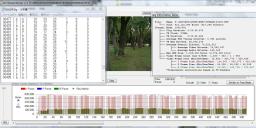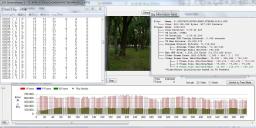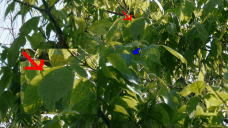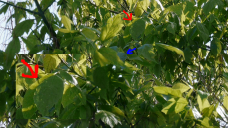
It allows to keep PV going, with more focus towards AI, but keeping be one of the few truly independent places.
-
Hi. I love bkmcwd's GOLGOP3-13 SednaAQ1C standard.
@bkmcwd, thanks for your superb settings and keep up the good work!
I heard that the Sedna matrix values on the gradation and has less banding, so I tested it in some scenes which have a lot of "bokeh".
first, the original
with some clips which have wrong WB, I corrected it a bit.next, graded version with adding some grain noise.
There are some banding there, but not so bad with grain noise.
BTW, anyone who are good at the color work, would you give me some advice about removing a banding in post processing?
(EDIT) oh, it's off topic, sorry for that.
-
I release the test settings of GOP3ZILLA and natural. These are all the experimental settings in HBR mode :-)
These are changed from previous versions in HBR, FSH, and SH.
These settings have not been completed yet.

 bkmcwd GOP3ZILLA_standard_V2_BETA.zip841B
bkmcwd GOP3ZILLA_standard_V2_BETA.zip841B
 bkmcwd natural_standard_V2_BETA.zip838B
bkmcwd natural_standard_V2_BETA.zip838B
 GOP3ZILLA_ST2_BETA_30p_ISO400_forest_sp_qp.JPG1296 x 634 - 203K
GOP3ZILLA_ST2_BETA_30p_ISO400_forest_sp_qp.JPG1296 x 634 - 203K
 GOP3ZILLA_ST2_BETA_25p_ISO14_160_forest_sp_qp.JPG1295 x 632 - 196K
GOP3ZILLA_ST2_BETA_25p_ISO14_160_forest_sp_qp.JPG1295 x 632 - 196K
 bkmcwd GOP3ZILLA_standard_V2_BETA2.zip841B
bkmcwd GOP3ZILLA_standard_V2_BETA2.zip841B
 bkmcwd natural_standard_V2_BETA2.zip839B
bkmcwd natural_standard_V2_BETA2.zip839B -
just tried your new GOP3ZILLA. On a high contrast scene I get very large I-Frames (980K) and super small B-Frames (80K). The video buffer hits the limit very fast so that the codec runs in fallback mode. Also, in my standard "crash test" it crashed immediately. That's a pity... it's really hard to get 1080i right...
edit - re GOP length tables: as I said I'm not sure whether or not these settings improve anything. Maybe the GOP length setting under "patches for end users -> AVCHD -> GOP Length" is sufficient... In any case changing the GOP length tables under "GOP Related" settings doesn't do any harm.
-
Just to throw in some more feedback: Using GOLGOP3-13-standard, I shot videos at two private events and one dedicated test scenario:
(1) "Bowling" - indoor scenery, no windows/daylight, moderate movement (the people throwing the balls), light conditions were difficult and changing - at times it was mostly dark with some colorful "disco lights" illuminating the room, sometimes ordinary flourescent lights were enabled, but lit only one half of the room (the half where the pins are).
I used 24H mode, and results were good - inevitably, some noise was present in the lower lit parts of the scenery, but no compressions artifacts and the noise looked very "natural".
(2) "Badminton Turnament" - indoor scenery, the tournament started in the evening, so no daylight from the windows, but the room was lit by numerous flourescent lights at the ceiling. Extremely quick movements (the Badminton players, at times I followed them with the camera, so also some extreme panning).
I used 720p60 mode, and results were very good - no artifacts even in the quick panning scenes with moving players, and extremely good and "natural looking" rendition of the quickest moving objects (e.g. the Badminton shuttle, which is known to move at >= 200km/h right after the racket hits for a smash).
I experimented a little with varying shutter angle, at 1s/400 shutter speed you can actually see the finer structure of the shuttle's tail when the ball is not too fast, but for the most natural reproduction of the motion I still like 180° shutter angle best.
(3) "Spanning Test": I mounted the GH2 on a tripod, zoomed to f=42mm, into the leaves of a tree that was moving in the wind. Used 24H, with enabled "Extended Tele" mode. Using a SanDisk 64GB 95MB/s, The card was filled without any trouble, so spanning worked fine! Resulting files had a bitrate of ~ 80MBit/s.
In the attached two screen shots from nearby frames, I marked two leaves and magnified one where you can see some compression artifacts. Nothing too serious, but the trained eye can spot those artifacts even at normal playback speed. :-) I wonder whether these minor artifacts are unavoidable, or whether there is still some room for improvement.
All in all, GOLGOP3-13 is still my favorite setting. Unlike e.g. Mysteron, it never crashed on me and I think the compromise on bandwidth vs. quality it makes is very reasonable (when using fast cards).

 tree1.png1920 x 1080 - 3M
tree1.png1920 x 1080 - 3M
 tree2.png1920 x 1080 - 3M
tree2.png1920 x 1080 - 3M -
Thank you for the polite feedback! :-)
"In the attached two screen shots from nearby frames, I marked two leaves and magnified one where you can see some compression artifacts."
How was qp of the macroblocks of this portion? Since it must be little bit poor at such a scene for GOLGOP3-13 series, I feel that it seems to be quite high. If it also includes shooting many leaves, I think that GOP3ZILLA series realizes high IQ with the most sufficient balance.
-
Pals, I have filmed a lot in 24H this weekend using a following merged setting and I was very satisfied. Basically, it's my merge of bkmcwd's GOP3ZILLA with SednaAQ1C, MAX frame/FB/SB limits and 'natural' Q18. GOP table tweaked a little bit, that's all from my side. It's obviously bkmcwd who takes all the credits. The result is really good, IMHO. Fat B-Frames/Sedna matrix cotribute to low-light performance, while Q18 and MAX I-frames make the setting very immune to infamous macroblock level lines artifacts. By the way I have seen 1160KB I-frames in the real-life footage I filmed with this setting. The beast? It could be, for those who don't care about a guaranteed in-camera playability of the 24H footage. @bkmcwd: if you get time and inspiration, could you please try to film a traditional fly-around in your small forest with this setting in 24H? Thanks a ton already. Cheers! P.S. Ignore other modes, it's intended as 24H-only test setting...

 sete.ini5K
sete.ini5K -
Thanks mate! :-)
"if you get time and inspiration, could you please try to film a traditional fly-around in your small forest with this setting in 24H?"
Since tomorrow's weather report rains, I will try, if it is fine the day after tomorrow.
It seems that BETA3 is still not good. :-( I am improving succeedingly.
-
@bkmcwd: Regarding "How was qp of the macroblocks of this portion?" - I am afraid I currently have no tool at hand which would allow me to find out on this easily.
Do I understand your statement "I think that GOP3ZILLA series realizes high IQ with the most sufficient balance" correctly in that you would expect GOP3ZILLA to deliver an overall better quality in the "moving leaves" scenario? Even though GOLGOP3 was described as using a higher average bandwidth?
-
@kovtun66 Sorry, but the Stream Parser report shows the encoder plunging into low-quality Fallback Mode on the left side of the frame chart. This indicates that the camera was not able to sustain the initial high bitrate and was forced to degrade the image quality to avoid crashing.
-
I am sorry that it becomes impossible for me to shoot in the forest since there will be my aunt's funeral tomorrow. And it is a rainy day today. :-(
Improvement in HBR mode is still under continuation. :-)
I am sorry that explanation in my English is insufficient.
"I am afraid I currently have no tool at hand which would allow me to find out on this easily."
How was qp in the result of JM-SP Decoder? If the value and range are known, I can do imagination about.
"Do I understand your statement "I think that GOP3ZILLA series realizes high IQ with the most sufficient balance" correctly in that you would expect GOP3ZILLA to deliver an overall better quality in the "moving leaves" scenario? Even though GOLGOP3 was described as using a higher average bandwidth?"
Yes. The difference between GOLGOP3-13 and GOP3ZILLA is a difference in an elated scene. On the high stress scene, like "moving leaves", GOP3ZILLA may become high IQ rather than GOLGOP3-13 as a result.
"Which version should we use in GOP3ZILLA standard V2? BETA2 or BETA3?"
Since these are all the experimental settings in HBR mode, use depending on conditions is possible for them. However, I understand that it is necessary to improve BETA3 more. Of course, I am working on now. :-)
-
I haven't even started sorting though all of bkmcwd's work and this thread but I just made a donation based on his dedication to VK. This is great work and a great community! Drop a buck or two to keep it real if you can. Kevin
-
Thanks and please try my settings, supposing you are interested. :-)
Now, how is this? I was conscious so that FSH could also be used. :-)
This is the experimental setting in HBR and FSH. The experimental setting of SH(60p) is also included.

 bkmcwd GOP3ZILLA_standard_V2_BETA4.zip841B
bkmcwd GOP3ZILLA_standard_V2_BETA4.zip841B -
@LPowell: oh... sorry, could you please explain how you know this from the stream parser? For example, here is the static death chart (by the way: in the REAL footage DC is most usually 5-7, QP 18-22 which, I suppose, is overall fine):

 screen_shot_stray_chart_static.jpg1226 x 594 - 157K
screen_shot_stray_chart_static.jpg1226 x 594 - 157K -
@kovtun66 The Stream Parser report you uploaded here shows an abrupt drop in I-frame size starting around frame 245:
http://www.personal-view.com./talks/uploads/FileUpload/54/c25e11f87fa7d418706c719074c64b.png
This indicates that the encoder was unable to sustain its initial high bitrate, and was forced down into Fallback mode, which uses low-quality quantization tables. Settings that exhibit this kind of behavior cannot be relied on in demanding situations.
Howdy, Stranger!
It looks like you're new here. If you want to get involved, click one of these buttons!
Categories
- Topics List23,992
- Blog5,725
- General and News1,354
- Hacks and Patches1,153
- ↳ Top Settings33
- ↳ Beginners256
- ↳ Archives402
- ↳ Hacks News and Development56
- Cameras2,367
- ↳ Panasonic995
- ↳ Canon118
- ↳ Sony156
- ↳ Nikon96
- ↳ Pentax and Samsung70
- ↳ Olympus and Fujifilm101
- ↳ Compacts and Camcorders300
- ↳ Smartphones for video97
- ↳ Pro Video Cameras191
- ↳ BlackMagic and other raw cameras116
- Skill1,960
- ↳ Business and distribution66
- ↳ Preparation, scripts and legal38
- ↳ Art149
- ↳ Import, Convert, Exporting291
- ↳ Editors191
- ↳ Effects and stunts115
- ↳ Color grading197
- ↳ Sound and Music280
- ↳ Lighting96
- ↳ Software and storage tips266
- Gear5,420
- ↳ Filters, Adapters, Matte boxes344
- ↳ Lenses1,582
- ↳ Follow focus and gears93
- ↳ Sound499
- ↳ Lighting gear314
- ↳ Camera movement230
- ↳ Gimbals and copters302
- ↳ Rigs and related stuff273
- ↳ Power solutions83
- ↳ Monitors and viewfinders340
- ↳ Tripods and fluid heads139
- ↳ Storage286
- ↳ Computers and studio gear560
- ↳ VR and 3D248
- Showcase1,859
- Marketplace2,834
- Offtopic1,320








